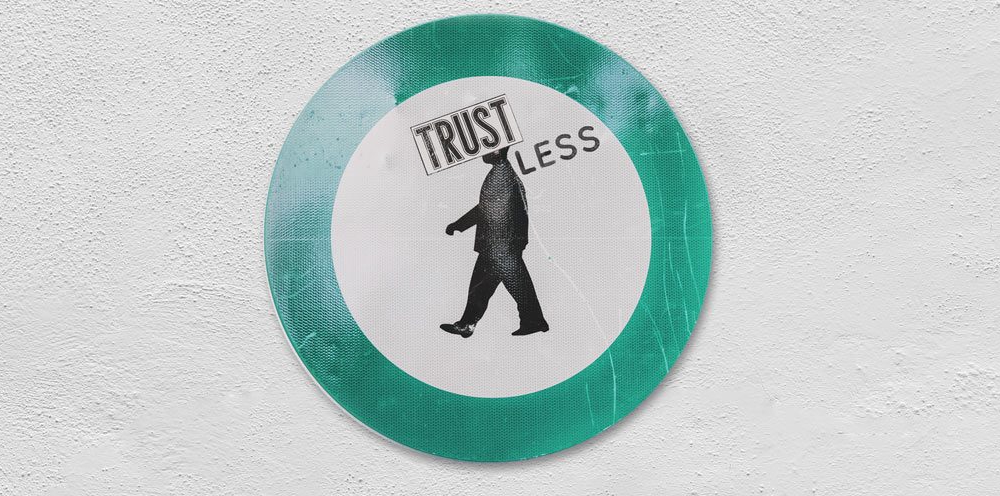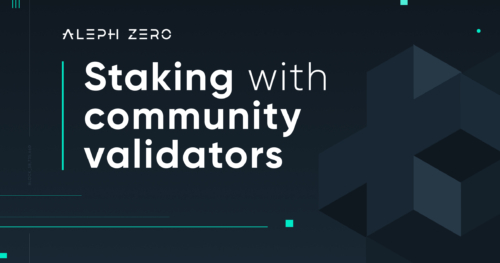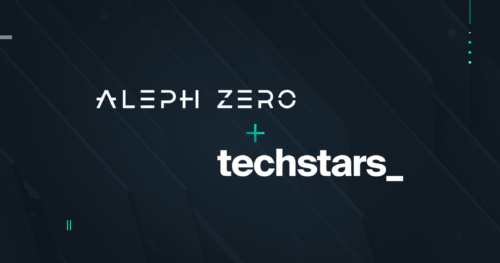Is Blockchain Trustless or Is It a Confidence Machine?
Jun 14, 2021

The Merriam-Webster dictionary defines the term trustless as “not deserving of trust.” We see blockchain as about not needing to trust the other party.
It doesn’t take a Ph.D. to realize that the term trustless doesn’t exactly inspire enthusiasm among those who have just begun their journey in blockchain. No other phrase associated with blockchain has caused as much concern and provoked as much discussion as the “T-word.” Here at Aleph Zero, the team often discusses the message a “trustless” blockchain conveys. We realize that it is ambiguous and presents a stumbling block for wider public acceptance. We have even made attempts to coin a new phrase to replace it. But first…
What Does Trustless in Blockchain Mean?
For those who are new to this, we must first explain what trustless encompasses. The term, which is used to discuss one of the core features of blockchain, has to do with how blockchain eliminates the need for trust among individuals. Nowadays, most transactions that occur between two groups require an intermediary of some sort. Someone who both sides trust to ensure that the transaction is legitimate (e.g., a bank). This has a few drawbacks:
- it centralizes power
- introduces bureaucracy
- there are higher transaction fees for transferring funds
- institutions are not that efficient regarding securing customer data due to single points of failure
- institutions run by humans are, by design, prone to human error
Blockchains’ goal is to decentralize power and trust by transferring trust from a single entity to the technology itself—and all the users who take part. The foundational element that guarantees the security of blockchain transactions is the consensus protocol. Users archive transactions on the distributed ledger through this system. Depending on the blockchain in question, there are different methods to reach this consensus. Broadly speaking, it is the cooperation of a vast number of entities who must decide on a single version of the truth. It is a system based on collaborative effort rather than centralized coercion.
On the Nature of Trust(less)…
The subject of whether something is trustworthy usually pops up when we have doubts about something or someone. For example, if you lend something to a family member, you do not consciously think about whether or not you trust this person. The question never enters your mind. Blockchain and the security measures it embodies have the goal of offering a similar sense of safety. Not in a creepy Big Brother kind of way. Rather in the meaning that the thought of whether something is safe or not shouldn’t enter your mind in an ideal relationship. Hence the “trustless” moniker. We understand trustless as meaning “not requiring trust”, rather than the definition proposed by the Merriam-Webster Dictionary. As a species, we ask questions about something being trustworthy only when fear appears. A byproduct of novelty is fear. If your memory reaches back far enough, you will remember the feeling of disbelief the Internet inspired back in the ’90s. Blockchain and distributed ledger technology (DLT) are at a similar point of time in their development. We all know what happened to the Internet. We believe a similar narrative is in store for blockchain.
Rise of the Machines
The researchers Primavera De Filippi, Morshed Mannan, and Wessel Reijers offer an interesting perspective on this subject. In their research paper “Blockchain as a confidence machine: The problem of trust & challenges of governance“, they frame blockchain technology, not in the context of trust but confidence. They differentiate between the two terms, arguing that trust involves risk-taking and vulnerability. When people engage in relationships requiring trust, they conduct a “leap of faith” and forgo rationality. There is an inherent inequality in this kind of relationship, with the party offering their trust to another actor being decidedly in a weaker position.
Confidence, on the other hand, depends on previous occurrences leading us to have expectations for how something will behave. They associate the secure nature of blockchain protocol as being more of a “confidence machine” than a trustless arrangement. In the context of blockchain, we can frame trust as something that happens between people, imperfect actors who have an irrational bent to themselves. The technology itself, though supplants this need for trust. Its very design inspires confidence. Think about the moment you enter a car to drive to the grocery store. On your way there, irrational actors surround you, an accident is always possible, and even when you were learning to drive, your instructor probably told you to display limited trust towards your fellow drivers. What inspires confidence that you will make it home safely? Perhaps your car? You know how it handles, and thus, you feel confident. Or maybe the traffic laws? Your experience has proved countless times that the rules generally succeed in ensuring your safety.
Rewriting the Social Contract
In our lives, we rely to a greater degree on confidence than trust. The protocols and consensus governing blockchain are, in a way, social contracts, with the technology itself being the authority that inspires our sense of security. Seeing that the strict laws of mathematics govern it, it is unbribable and not prone to human irrationality. Its value as an intermediary between human actors has to do with the confidence the human actors bestow upon it. If it fails to inspire confidence, the user base can always migrate to a different blockchain. One that more accurately reflects the values desired by users. This technology, therefore, offers a freedom that is unavailable for the average person in real life, as we are relegated to positions in society that we haven’t always chosen (origin, race, culture, sex, etc.).
If Not Trustless Then What?
As mentioned in the introduction, the team at Aleph Zero has spent significant amounts of time by the water-cooler discussing the merits and pitfalls of the term “trustless.” The consensus is that it is at once the best and the worst word to describe the nature of blockchain and DLTs. We’ve tried coming up with alternatives such as distributed trust, communal trust, shared trust, etc. None of these propositions really gets at the spirit of blockchain the way “trustless” does, though. The English language has countless examples of words that at one point were pejorative before being widely accepted as something positive. For example, “terrific” at one point meant “terror-inducing.” This metamorphosis is a cause for optimism. It means that blockchain, as it becomes more widely adopted, will also influence the English language.
And perhaps, someday, we will see the dictionaries change their definition of trustless into a term that inspires confidence.

